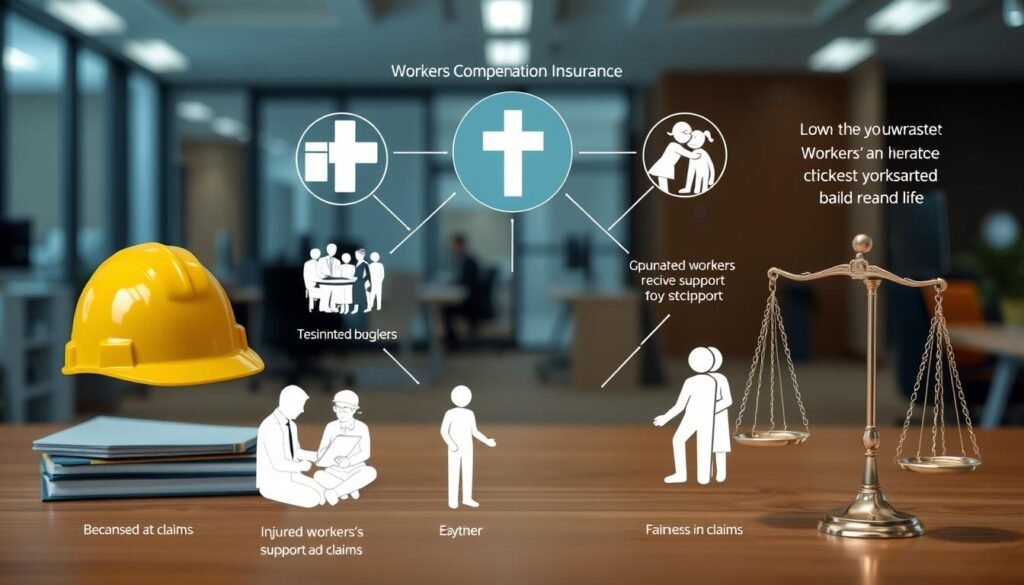Unexpected events like fires, thefts, lawsuits, and car accidents can hurt your finances. Insurance acts as a safety net to help you recover. When you buy an insurance policy, you make a legal deal with the insurance company.
In this article I will discuss in-details about How Can Insurance Protect You From Financial Loss?. If you face a covered loss and file a claim, the insurance company will help. They pay you or your chosen beneficiary according to your policy. This can give you the financial help and peace of mind you need during tough times.
Table of Contents
ToggleKey Takeaways
- Insurance provides a financial safety net for unexpected events
- Insurance policies are legal contracts that outline coverage and claims processes
- Insurance can offer financial assistance and peace of mind during difficult times
- Insurance helps manage financial risks and protect your assets
- Insurance coverage can be tailored to your specific needs and risks
How Can Insurance Protect You From Financial Loss?
Financial loss can happen for many reasons. This includes natural disasters, accidents, illnesses, or theft. These events can lead to big expenses that can use up your savings fast.
Insurance helps a lot by offering financial protection. It gives you money back when you lose something covered by the policy. This way, you can keep your money safe, even when things go wrong.
Understanding Financial Loss
Financial loss can take many forms. It might be the cost to fix or replace damaged property. Or it could be the loss of income because of illness or disability.
These losses can really hurt your money situation. They make it hard to pay for things you need and plan for the future.
The Role of Insurance in Mitigating Risks
Insurance helps you deal with the risks of financial loss. When you buy an insurance policy, you pass the risk to the insurance company. They will help pay for the losses you face.
This lets you focus on getting better instead of worrying about money. It’s a big help in tough times.
| Key Components of Insurance Policies | Description |
|---|---|
| Premium | The amount you pay to the insurance company for coverage. |
| Policy Term | The duration for which the policy remains in force. |
| Policy Limit | The maximum amount the insurance company will pay for a covered claim. |
| Deductible | The amount you must pay out-of-pocket before the insurance company covers the rest. |
Knowing about insurance policy parts helps you choose the right coverage. It protects you from financial losses, unexpected events. It also helps with disaster recovery and risk mitigation.
The Importance of Insurance in Financial Planning
Adding insurance to your financial plan is key to a strong safety net. It protects your assets and covers unexpected costs. It also helps your family in tough times. With the right insurance, you’ll feel more secure and ready for anything.
Learn more about insurance and how it keeps your finances safe.
Building a Financial Safety Net
Insurance is the heart of a solid financial plan. It guards against many risks. The Insurance Information Institute says 5% of homeowners file claims each year.
Homeowners and liability insurance are vital. They offer extra protection. Umbrella policies, for example, cost between $150 and $300 yearly for each $1 million in coverage.
Long-Term Financial Stability
Insurance also helps keep your finances stable over time. Disability insurance is key. It helps if you can’t work due to illness or injury.
Statistics show 5.6% of workers face short-term disabilities yearly. This coverage is crucial.
Peace of Mind
Insurance also brings peace of mind. A 2022 Fidelity report found retirees might need $315,000 for healthcare. Comprehensive health insurance is vital.
Life insurance gives your family financial security. It can offer tax-free money and help with estate taxes.
“By having the right insurance coverage in place, you can enjoy greater peace of mind, knowing that you are prepared to handle life’s uncertainties and maintain your financial well-being.”
In summary, insurance is vital for a strong financial base. It protects your assets, ensures stability, and gives peace of mind. It’s a key part of any good financial plan.
Key Ways Insurance Protects Against Financial Loss
Insurance is a strong tool for managing risks. It helps keep your money safe in many ways. It protects your stuff, like your home and things you own, and your money too.
Risk Management and Asset Protection
Insurance can manage risks and keep your stuff safe. It covers damage to your home or business. It also protects you from legal problems.
With property insurance and liability insurance, you’re safe from big financial hits.
Critical Cost Coverage
Insurance also pays for unexpected costs. This includes medical bills, home fixes, and legal fees. It keeps your money safe and stops big financial problems.
Income Replacement
Disability insurance and life insurance are key. They replace lost income if you can’t work or if someone dies. They keep your family’s money safe.
“Insurance is a powerful risk management tool that can help protect you against a wide range of financial losses.”
Knowing how insurance helps, you can plan better. You can protect your stuff, handle surprises, and keep money coming in when needed.
Understanding Insurance Policies
Insurance policies are legal contracts that explain your coverage and terms. It’s important to know the key parts of an insurance policy. This helps you choose the right coverage and get the protection you need.
The four main parts of an insurance contract are the Declaration Page, Insuring Agreement, Exclusions, and Conditions. The Declaration Page has details like what’s covered, the premium, and deductible. The Insuring Agreement is the insurer’s promise to cover you. The Exclusions and Conditions sections tell you what’s not covered and any policy limits or requirements.
The premium is the cost of your insurance. The deductible is what you pay before the insurer covers costs. The policy limit is the most the insurer will pay for a covered loss.
| Insurance Policy Components | Explanation |
|---|---|
| Premium | The cost of your insurance coverage |
| Deductible | The amount you pay out of pocket before the insurer covers costs |
| Policy Limit | The maximum amount the insurer will pay for a covered loss |
Endorsements and riders can be added to your policy. They can change your coverage or add extra protections. Knowing these policy parts is key to picking the right insurance. It ensures you have the financial protection you need.
Types of Insurance for Comprehensive Financial Protection
To get full financial protection, you need different types of insurance. Auto insurance, life insurance, and more each play a key role. They help protect your stuff, income, and health.
Auto Insurance
Auto insurance is a must for drivers. It covers damage to your car and others. In 2022, 31,785 people died in car accidents in the U.S., showing why it’s so important.
Homeowners and Renters Insurance
Home and renters insurance protect your things and you. They cover damage and personal liability. Disability insurance costs 1% to 3% of your salary, making these policies valuable.
Life Insurance
Life insurance is key for your family’s financial safety. In 2023, 48.9% of families with two working parents showed its importance. It helps when a breadwinner dies.
Health Insurance
Health insurance pays for medical care and prevention. In 2021, 9.2% of Americans were uninsured. Family plans cost up to $22,463 a year in 2022.
Disability Insurance
Disability insurance helps if you can’t work. The Social Security Administration says 25% of workers will get disabled before retirement. Yet, 35% of workers lack this insurance.
Having auto, home, life, health, and disability insurance creates a strong financial safety net. Experts say these are essential. You might even get discounts for buying them together.
“Approximately 70% of individuals aged 65 and older will require some form of long-term care during their lifetime, with the average annual cost of a private room in a nursing home reaching $108,405 and expected to rise to $141,444 by 2030.”
| Insurance Type | Key Benefits | Average Annual Cost |
|---|---|---|
| Auto Insurance | Liability, collision, and comprehensive coverage | Varies based on factors like driving record, location, and coverage levels |
| Homeowners/Renters Insurance | Property damage and personal liability protection | Homeowners: $1,383 (national average in 2022) Renters: $179 (national average in 2022) |
| Life Insurance | Financial security for dependents | Term life: $26 to $44 per month (for a 20-year, $500,000 policy for a healthy 35-year-old) Whole life: $100 to $400+ per month (depending on coverage amount and age) |
| Health Insurance | Medical expense coverage, preventive care benefits | $22,463 (average annual premium for family coverage in employer-sponsored plans in 2022) |
| Disability Insurance | Income replacement during a disability | 1% to 3% of annual salary |
Choosing the Right Insurance Provider
Choosing the right insurance provider is key to securing your financial future. You need to look at coverage options, financial strength, and customer service. By doing your research, you can find the best coverage for your needs and budget.
Evaluating Coverage Options
Start by looking at what each insurance provider offers. Make sure their policies cover your specific needs, like auto or health insurance. Check if the coverage limits and deductibles fit your financial goals.
Assessing Financial Strength Ratings
It’s important to check the financial strength of insurance providers. Look for high ratings from agencies like AM Best or Moody’s. These ratings show the company can pay claims when needed.
Reviewing Customer Service Reputation
Good customer service is crucial. Read online reviews and check the Better Business Bureau. Choose insurers known for being responsive and satisfying customers.
Comparing Policy Costs and Benefits
Compare the costs and benefits of different policies. Look at premiums, deductibles, and coverage limits. The cheapest policy might not offer the best protection, so balance cost and coverage.
By carefully evaluating insurance providers, you can find the right coverage. This will protect you from financial loss and give you peace of mind.
Navigating the Insurance Claims Process
The insurance claims process can seem complex. But knowing the key steps can help you get a good outcome. It’s important to give all the needed documents and evidence. Also, watch the deadlines and work well with your insurance company.
Filing a Claim
Start by calling your insurance company right after something happens. Tell them all about what happened and give them any proof you have. Working with them will help speed up your claim.
Documentation and Evidence
Keep good records during the claims process. Collect all bills, receipts, and repair estimates. Also, take photos of what was damaged. This helps prove your claim and get a fair settlement.
Timelines and Deadlines
Insurance companies have strict rules for when you can file a claim. It’s important to meet these deadlines to get your claim processed fast. Know your policy’s rules and work with your insurer to meet deadlines.
Understanding the Payout Process
After your claim is approved, the insurer will figure out how much to pay you. This money might go straight to you or to someone else, like a repair shop. Keep up with the process to get a good outcome.
Claim Assessment
The insurance company will check your claim carefully. They might send someone to see how bad the damage is. Be ready to give them more information or proof if they ask.
Receiving Compensation
After your claim is approved and the amount is decided, you’ll get your money. The insurer will either pay you directly or to someone else, like a doctor. This depends on your claim type.









